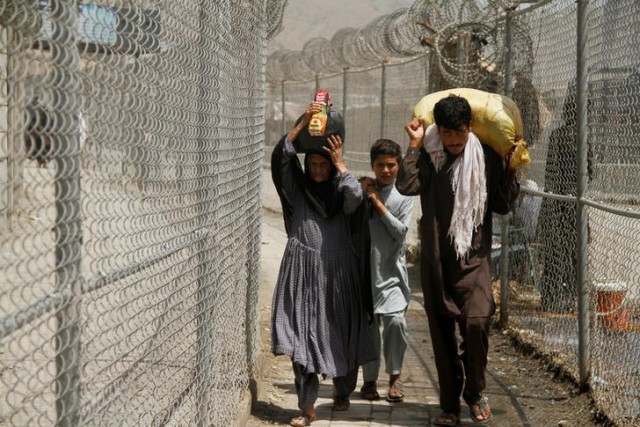Aid agencies struggle to assist wave of returning Afghan refugees
At Torkham, the busiest border crossing between Afghanistan & Pakistan, nearly 170,000 Afghans have returned this year

A family coming from Afghanistan walk down a corridor between security fences at the border post in Torkham, Pakistan June 18, 2016. PHOTO: REUTERS
The flow of returnees from Iran and Pakistan this year, estimated by the United Nations to number more than half a million, is straining the capacity of the government and aid agencies, even as violence uproots more Afghans around the country.
At Torkham, the busiest border crossing between Afghanistan and Pakistan, nearly 170,000 Afghans have returned this year, according to the UN, as relations between the two countries have deteriorated.
200,000 Afghan refugees return in exodus from Pakistan: UNHCR
Islamabad has stepped up pressure to send people back and numbers have risen sharply in recent months as Afghan-Indian relations strengthened and those between India and Pakistan soured.
Lines of colourfully decorated trucks pass through the border gate at Torkham, navigating the mountainous passes with returning refugees clinging to piles of household goods, sometimes with a family cow nearly buried in the back.
A cluster of white tents only a few hundred meters from the border marks the first facility operated by the UN, the Afghan government, and other aid agencies to provide aid for returnees before they look for a home in a country many have not seen in years.
Returning home: More than 350,000 Afghan refugees return, says UN
Here, and at other sites nearby, families are offered medical checkups, bundles of basic supplies and food.
In September, the UN issued an appeal for millions of dollars of emergency funding to help returning refugees and other internally displaced people in Afghanistan, but so far the fundraising has yet to reach its goal, said Mark Bowden, the UN's humanitarian coordinator in Afghanistan.
"Out of the $150 million that we requested, we've only got $48 million so far, and our costs are certainly going to be running quite high over the winter period," he said.
Freezing temperatures
While the winter is usually mild in the area of Nangarhar province where many returning refugees have at least temporarily settled, many others have headed further west to Kabul, where freezing temperatures may take a toll on anyone unable to find accommodation, Bowden said.
Escalating friction between Afghanistan and Pakistan flared into brief clashes at the Torkham border crossing in June, the violence symptomatic of a wider decline in relations between Pakistan and Afghanistan that has prompted political and sometimes military confrontations.
While the challenges of helping the returning Afghan refugees requires immediate attention, the international community should work with Afghanistan, Pakistan, and Iran to try to solve the broader problems driving the crisis, said Tadamichi Yamamoto, head of the UN assistance mission in Afghanistan.
"This could be a long-term issue, but I think the immediate attention now will define the magnitude of the problem that we have down the road," he said. "So we need to do it right at the start."



















COMMENTS
Comments are moderated and generally will be posted if they are on-topic and not abusive.
For more information, please see our Comments FAQ